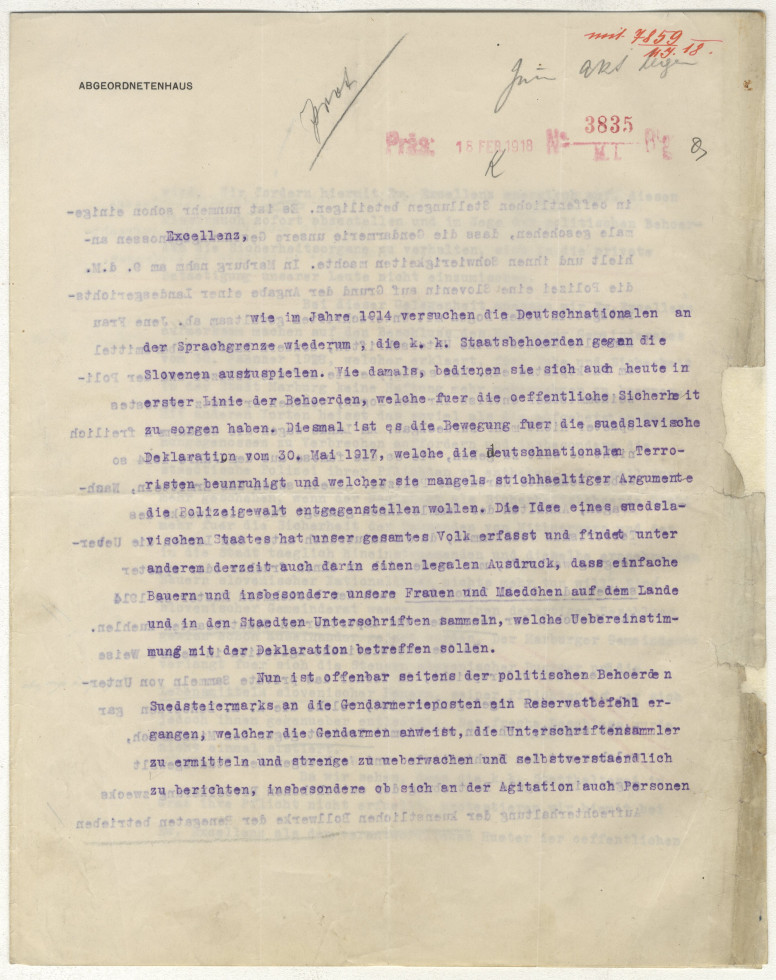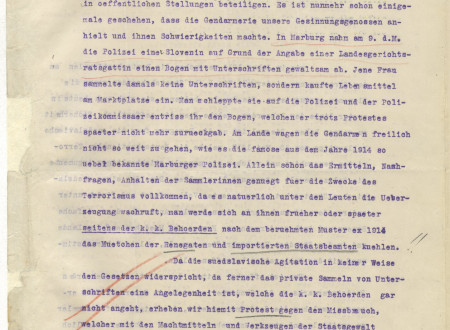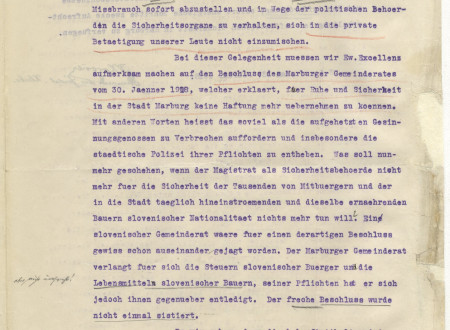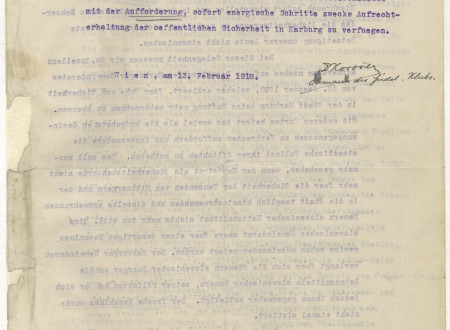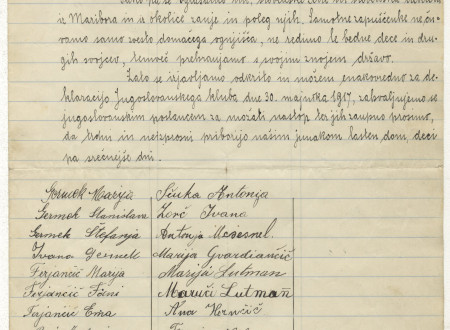Incidents Occurring When Collecting Signatures in Support of the May Declaration
The Letter Written by the President of the Yugoslav Club Dr. Anton Korošec to the Austrian Minister of the Interior and One of the »Controversial« Statements
At the end of May 1917, Slovenian, Croatian and Serbian members of the Austrian parliament founded their joint Yugoslav Club and issued a statement in which they called for the unification of those Habsburg territories that were inhabited by the Slovenians, Croats and Serbs. Such newly created independent state body was to be ruled by the House of Habsburg-Lorraine, was to be free from foreign domination and built on the basis of democratic principles. The statement (so-called May Declaration) was on the following day, May 30, read in the Parliament by the president of the Yugoslav Club Dr. Anton Korošec. It met a widespread response among Slovenians, but not until the autumn of 1917, when the launch and the spreading of the May Declaration movement had been favoured by the Ljubljana Prince-Bishop Anton Bonaventura Jeglič, on whose initiative the representatives of Slovenian political parties signed a joint statement in support of the May Declaration on September 15, 1917.
Once this statement was published in daily newspapers, a massive declaration movement was launched. Municipal committees, associations and individuals alike provided their signatures in support of the May Declaration. Most of the signatures of private persons were collected between December 1917 and March 1918. 507 municipals and municipal committees sent their signatures, as did approximately 150,000 individuals. Then there were also 200,000 signatures of girls and women, the list of which was submitted to Dr. Korošec by Franja Tavčar at the massive convention in Ljubljana in March 1918.
Although the government and the emperor had no intention to meet the demands stated in the declaration, the content of the declaration could not be considered against the law, since it called for the reformation of the state within the Habsburg Monarchy. The subjects’ loyalty to the House of Habsburg could also clearly be seen on various lists that contained signatures in support of the declaration. Some conflicts, however, did occur and police intervention was needed in certain places, especially in ethnically mixed areas in Carinthia and in certain parts of Styria.
Kept among the records of the Ministry of the Interior, there is also a document created during the first months of 1918 titled “Collection of Signatures in Support of the Independent Yugoslav State”. It contains reports written by provincial presidents, letters issued by provincial authorities inquiring about how to treat the whole situation, and letters of complaint written by the Yugoslav Club. Preserved among them is a document that refers to an incident in Maribor. A cook Elizabeta Macher, who supposedly collected signatures at the Maribor market place, was taken to the police station and her list of collected signatures was confiscated. The City Council and the mayor demanded instruction from the Styrian provincial government in Graz, inquiring whether such agitation was even permitted. The confiscated list with signatures was enclosed to their letter and all documents were sent to the Ministry of the Interior.
Condemning such actions of the authorities, in February 1918 Anton Korošec wrote a letter of protest to the Minister of the Interior. He believed that gendarmerie in southern Styria must have secretly been instructed to supervise agitation activities for the May Declaration and report to their superiors about them. According to Korošec, there had been several instances when gendarmerie caused trouble for supporters of the declaration. He then went on to describe the incident with Elizabeta Macher, who he believed had not been collecting signatures at all, but merely doing some shopping at the market. He emphasized the fact that Yugoslav agitation was in no way against the law and demanded that abuse of this kind stop immediately and that security authorities start respecting people’s privacy.
He also drew attention to the fact that on January 30 Maribor City Council stated that it could no longer secure law and order in Maribor. According to Korošec, this was like inviting troublemakers to commit crimes and release the city police of its duties. Police apparently was not prepared to do anything to protect the safety of thousands of people, who lived in Maribor, and of the farmers, who came to Maribor and fed the city. In other words, the City Council demanded taxes and food from Slovenian farmers, but refused to carry out its duties. Since the provincial government in Graz apparently did nothing to stop this, Korošec demanded that the minister, as the guardian of public safety and legality of City Council’s decisions, do something immediately to ensure public safety in Maribor.
Members of the Yugoslav Club also submitted several parliamentary questions regarding the actions of the authorities in Carinthia and Styria to the president of the Austrian parliament and to different ministers.
By March 1918 the focus of May Declaration movement was shifted from collecting signatures to mass public gatherings. The final breakup happened on May 25, when the emperor promised indivisibility of lands to Germans who lived in Slovenian territory. Two days later, Slovenian political parties issued a statement, expressing their firm determination to stick to their demand for the foundation of the Yugoslav state. This statement, however, no longer contained the so-called Habsburg clause.
Andreja Klasinc Škofljanec


